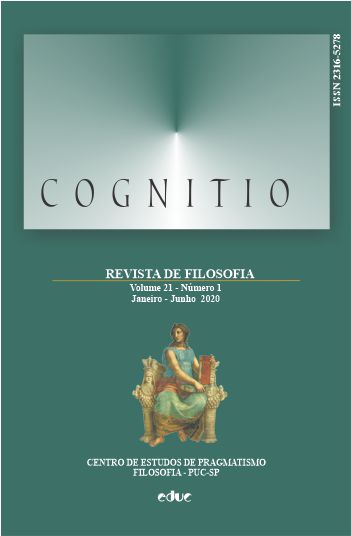Perfectivity in Peirce’s energetic interpretant
DOI:
https://doi.org/10.23925/2316-5278.2020v21i1p152-164Keywords:
Aspect, Energetic interpretant, Exertion, Pheme, Peirce, Secondness.Abstract
This inquiry illustrates how Peirce’s Energetic interpretant facilitates consciousness-raising between sign users. Peirce characterizes the Energetic/Existential Interpretant as “exertion,” and “effort” (CP 4.536, MS 318). Because it forces attention and progression of action, the Energetic Interpretant highlights atomistic/punctual cause-effect sign relations by featuring junctures between events: beginning, middle, end. The Firstness and Thirdness underlying it further perpetuates the punctual component (VENDLER, 1967) present in action relations, operational when effort produces resistance against an opposing feeling/force. Effort, however, is but one side of Peirce’s Energetic Interpretant; the opposing (and often more supervenient) side is when external elements (“Perceptuations”) have a more active role (MS 339, 1905) in destroying former beliefs/actions (CP 8.330, 1904). Energetic Interpretants can inhibit (Secondness), i.e., attention to one stimulus, while ignoring another. Nonetheless, consciously inhibiting/resisting a force (via Energetic Interpretants) introduces control beyond the self—another’s reflections upon the conscious acts of an agent (MS 318). This influence between interlocutors satisfies Peirce’s maxim of a “common place to stand” (MS 614), demonstrating mutual comprehension of the sign’s proper effect (CP 5.475). In fact, Energetic Interpretants may result in an effect of such proportion upon either or both interlocutors that a habit-change materializes. As such, Energetic Interpretants epitomize the perfectivity exercised by particular efforts, intimating the likelihood of their discursive success.Metrics
Metrics Loading ...
Downloads
Published
2020-07-19
How to Cite
West, D. E. (2020). Perfectivity in Peirce’s energetic interpretant. Cognitio: Revista De Filosofia, 21(1), 152–164. https://doi.org/10.23925/2316-5278.2020v21i1p152-164
Issue
Section
Papers on Pragmatism















